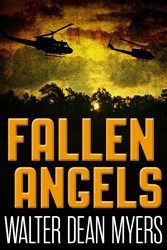Knock Knock

Lisa Bullard: My Not-So-Overnight Success
Early on, when people would ask my kid self what I wanted to be when I grew up, I’d answer “Shoe Salesperson.” But then I discovered that feet sometimes smell, and I moved on to a different dream: Book Writer. I could invent a great story and tell you that I crafted a long-term plan to realize my dream. But instead, this is

Lynne Jonell: Accessing Childhood Emotion
They say that, if you’re a doctor, it’s not something you want to admit to at an event where you’re going to have to make small talk with a lot of strangers. Because invariably people will want your opinion on their rash, or the funny flutter in their chest, or the odd bump on their knee. I wouldn’t

At the Dying of the Year
by Virginia Euwer Wolff Now winter downs the dying of the year, And night is all a settlement of snow… —Richard Wilbur, “Year’s End” We all have our circles of particularly mourned lost ones. As our hemisphere darkens down in this elegiac season of the winter equinox, and death has been so relentlessly in the air during 2015, I wave

Mary Casanova: Cultivating Quiet
by Mary Casanova Eudora Welty wrote in One-Writer’s Beginnings: “Long before I wrote stories, I listened for stories.” The more I write, the more I find that writing is about listening to stories that need to be told. Listening at a deeply intuitive level, however, demands shutting out a frenetic world in favor of a quieter life — one that supports and nurtures creativity — and

The Power of Fiction to Help Kids Grow
by Elizabeth Fixmer The years I spent in private practice as a psychotherapist specializing in work with children propelled me to become a children’s writer. My use of books as a therapy adjunct evolved over time, as did my respect and eventual awe for the power of fiction as a change agent. My young clients introduced me to middle-grade and

Marion Dane Bauer: Animals in Stories, Animals in the World
by Marion Dane Bauer Who doesn’t love a puppy? Well, admittedly there are some folks who don’t, especially considering how difficult both ends of such creatures are to keep under control. So let’s rephrase the question: Who doesn’t love a puppy in a children’s story? Or even a frog or a toad, for that matter? Something happens to a story when it

Jen Bryant: The Writing Apprenticeship
by Jen Bryant Several months ago, I was asked to be on a panel for a new-writers workshop. During the question and answer period, one woman commented: “I keep hearing that writing is a craft that requires time and practice to master. I get that … but as someone who’s eager to be an apprentice but has neither the time

Liza Ketchum: Serendipity
Serendipity is one of my favorite words. I love its dancelike sound and the way it trips off the tongue. According to my dictionary, serendipity means “the faculty of making fortunate discoveries by accident.” I find the etymology of words fascinating. Even as a child, I liked to study the maps that show the relationship and origins of

Avi: Bags of Cement
For reasons both boring and complex, I currently find myself under obligation to deliver four novels before the next twelve months are out. Two are written, but undergoing revisions. A third has started. The fourth has nothing on paper; only in my mind. Is it an accident that my shoulders have been aching, as if I had been

Melissa Stewart: A Different View
Recently, I spent several weeks struggling with a work in progress. Day after day, the words just wouldn’t flow. Over the years, I’ve learned that there’s no way to force a stubborn manuscript. I just have to focus on something else until my mind somehow sorts things out. Sometimes I begin work on a different book, but in this case, I decided

Debra Frasier: A Series of Mistakes
Fifteen years ago my ten year old daughter came home with a story. “Mom, “ she said, “today I figured out that “miscellaneous” is NOT a person.” I burst out laughing. “So who did you think it was?” I asked. “I thought she was that woman on the green spaghetti box…” I saved her gift-of-a-mistake in my little journal and

Candice Ransom: Being Ten
Every summer I wish I was ten again, the perfect age for the perfect season. At that age I was at the height of my childhood powers. And as a reader, books couldn’t be thrust into my hands fast enough. Every morning I’d eat a bowl of Rice Krispies, with my book at the table (my mother wouldn’t let me

Lisa Bullard: My Superpower
When I do school visits, the students treat me like a superhero. The time with them is exhilarating, and it would take a much more hardened heart than mine to resist the curiosity and imagination these young people exhibit. But my classroom days also leave me bone-deep exhausted. One afternoon, midway through a weeklong residency, I lay down in my

Lynne Jonell: Justice in Another World
by Lynne Jonell I just met a woman who lived through horrifying emotional abuse as a child. I had been told about her history some years before; but when I met the woman, we didn’t mention it. We talked instead about books, a subject of common interest, and teaching, her passion. I made an effort to forget what I knew

Virginia Euwer Wolff: Considering Flaubert
by Virginia Euwer Wolff For years I’ve taken primitive comfort in Gustave Flaubert’s mid-nineteenth century remark in a letter to a friend: “Last week I spent five days writing one page.” And Garrison Keillor’s Writer’s Almanac reminded us (Dec. 12, 2014) that Flaubert often put in a comma one day and took it out the next. Yes, sure, fine, yeah, we
